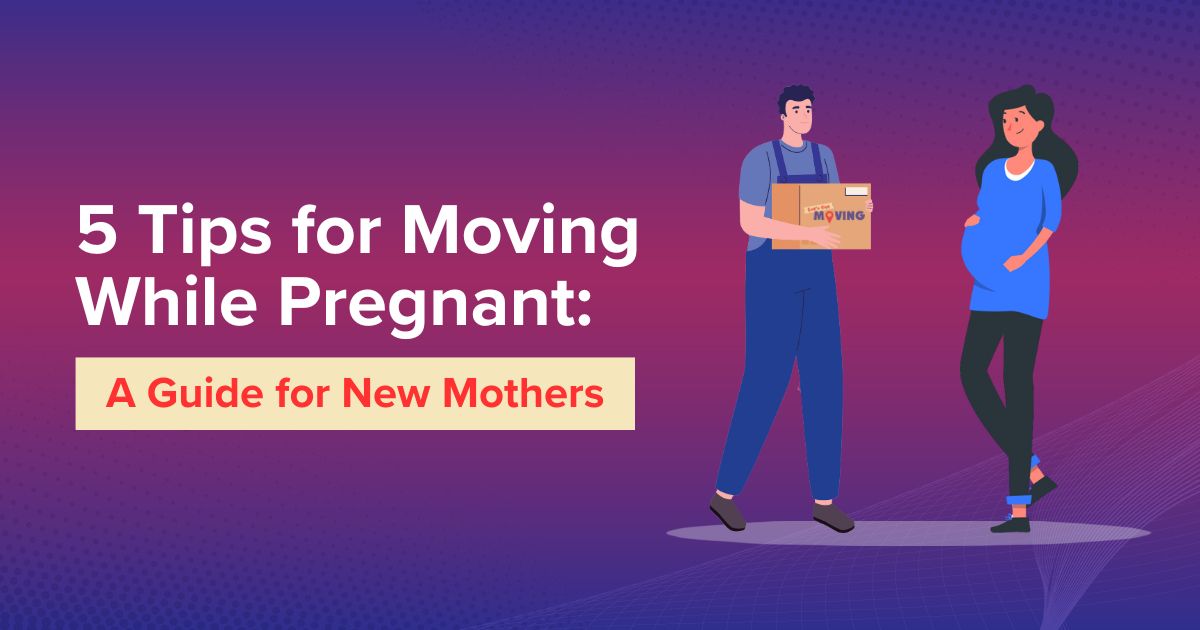What is more stressful than moving homes? Moving while pregnant.
First, let us congratulate you because if you are reading this, you will likely expect a baby soon. However, it also probably means you’re planning to move while pregnant.
Relocating during a pregnancy adds more complexities to an already challenging process. That’s what inspired us to cover this topic. Our moving company has acquired a lot of experience in 14+ years of moving Canadians and Americans into new homes and offices. It may be your first pregnancy, but we’re here to tell you that you’re not alone.
Brittani Velasquez is the founder of ñuñuy Nursing Apparel, and she successfully moved while seven months pregnant with her first child. “Pregnancy can be draining,” says Brittani. “Be mindful of your energy levels, and don’t hesitate to take breaks. Moving is a marathon, not a sprint.”
Not only have we executed many moves that must occur while the client is pregnant, but we also tapped into pregnancy experts like Haveananny’s Liza Maltz for real tips on moving while pregnant or with a newborn. Liza is an NYC single mom, entrepreneur, and birth doula who has seen many instances where expectant moms are preparing for a move.
We hope the following tips and advice—planning a move, packing boxes, moving furniture while pregnant, and what to do if you’re a control freak who doesn’t like to delegate—only help to reduce your worries during a potentially high-stress process.
Relocating While Pregnant? We Know How Challenging That Is
As moving experts with a team that services many locations across Canada and the United States, we know the challenges of moving during pregnancy. Especially when our customers are moving quickly to upsize before the baby comes.
“I cannot tell you how often I see this,” says Liza. “Many parents move while pregnant, so they have an extra room for their baby, a baby nurse, or family members who can sleep over and help with the newborn.”
Like us, Liza and Brittani champion a health-first sentiment of hiring help, taking regular breaks, and staying hydrated. (More on that later!)
Movers and pregnancy experts alike cannot stress enough the importance of working with local moving companies instead of doing everything yourself. That and some planning can help reduce the overall stress of the move and therefore the stress transferred to the baby. Even with professional Toronto movers doing most of the work, there is plenty of preparation work to take care of before moving house. Decluttering, organizing, and packing for a move can be lengthy and laborious.
5 Tips to Move While Pregnant
The moving process is already a challenge that requires careful planning, preparation, and attention. Doing so with a baby on the way requires extra work to ensure the safety and comfort of mother and baby.
Tip 1: Plan Early When Moving Homes While Pregnant
Our moving experts say to start planning to move up to six months before moving to allow ample time to organize, declutter, and figure out logistics without the rush. Do a little each day because last-minute packing will only increase stress.
Draft a detailed timeline of tasks leading up to the move. Include tasks like medical appointments, registering at a new healthcare facility, and setting up the baby’s new room.
Why? During pregnancy, the fluctuation of hormones affects all kinds of neurons in the brain, resulting in memory problems, poor concentration and absentmindedness. “Pregnancy brain is totally a thing,” says Liza. “Make notes, use Post-Its, and have a to-do list on your phone.”
Early planning to mitigate the effects of pregnancy brain is extra helpful.
Tip 2: Safe Packing Strategies for Expectant Mothers
Residential move while pregnant becomes a little easier when you use the preparation time to declutter, organize and pack efficiently.
-
Use smaller boxes to avoid heavy lifting
When lifting, use proper bending and lifting techniques that help you brace and balance when you’re carrying a baby.
-
Learn to bend and lift
Learning the art of bracing and lifting during pregnancy can help when bending to lift even small and light items. “Bend at the knee,” insists Liza. “Do not bend over from the waist to pick up heavy objects. Your back and pelvic floor will thank you.”
-
Do not lift heavy items!
If you lift more than 23 kg (50 lb) after the 20th week of pregnancy or more than 11 kg (24 lbs) after the 24th week, pregnancy experts advise you to ask your doctor.
-
Stay hydrated
Hydration takes on a new meaning for pregnant women engaging in lengthy and laborious days.
“Out of my hundreds of birth clients over the years, I don’t think I’ve had one who is hydrated enough,” says Liza.
“Your body is working overtime, and while you might be guzzling from your Stanley, you’re also sweating, producing amniotic fluid, and secreting other bodily fluids; you have approx 2.5 extra litres of blood volume! Hydration can help with muscle aches and pains and has many benefits in pregnancy (and labour).”
-
Pack an essentials bag
Pack a bag using this hospital bag checklist if you are close to the due date.
-
Don’t handle hazardous materials
You will find that some of the things you shouldn’t handle while pregnant also happen to appear on the list of dangerous substances that movers can’t move.
Tip 3: Delegate Heavy Lifting and Moving of Furniture
We get it—delegating the moving of your precious belongings takes trust and letting go of control to a moving company and its professional movers.
Don’t risk your health and the health of your developing baby during a move. Here are some helpful hints for effective delegating and communication during a move.
-
Hire professional movers
Hire professional movers experienced in handling moves for expectant mothers or families with newborns. They can handle the heavy lifting and ensure furniture survives the move safely.
-
Seek help from family and friends
If your loved ones are often willing to support you during this time, don’t hesitate to ask for help.
-
Start small
Begin by delegating small, low-risk tasks. As you see them completed successfully, your comfort level with delegating will grow.
-
Be clear about expectations from movers
When you delegate a task, be clear about what you expect regarding outcomes and deadlines.
-
Trust your movers
Trust them to handle tasks, whether it’s family, friends, or professional movers. Remember, it’s okay if things aren’t precisely your way as long as they get done well.
-
Check in periodically
Instead of micromanaging, set up times to check in on progress to help ease your anxiety about how others handle the tasks you give.
Tip 4: Moving While Pregnant When You Have Young Children
Moving while pregnant or with a newborn requires extra care and consideration, but it can be a smooth transition with proper planning and support.
-
Plan for the potential of morning sickness
“Everything is harder with morning sickness,” says Liza. “Try upping your protein and eating small meals every two hours to help. A nice ginger candy or ginger drink can help soothe.” She advises consulting with your doctor first, as some people with clotting disorders or hemophilia should not eat ginger; your doctor may also prescribe medicines to help with your symptoms.
-
Baby-proof early
Prepare the baby’s room ahead of time. Ensure your new home is baby-proofed before you move in.
Check for potential hazards and install safety gates, outlet covers, and cabinet locks. Make the nursery a priority to immediately give your baby a safe, comfortable space.
-
Load your newborn’s stuff last
The last thing to go on the truck is the first thing to come off and into the new home.
Packing their favourite stuff onto the truck last (their play kitchen or a box of their favourite toys and stuffed animals) means you can pull it off first, and they don’t need to wait to have the items that comfort them in their new home.
-
Get babysitting help
Contact a relative or familiar babysitter to watch your young children during the move.
The less disruption in their routine, the better, so keep them away from the moving activities and in the company of someone they love.
Tip 5: Keep Your Relocation as Stress-Free As Possible
Managing stress levels is especially important for mothers who are moving when pregnant. Here are some stress-busting tips from pregnancy experts.
-
Keep active until moving day.
Making time for physical activity while pregnant, including walks or yoga, will lower your cortisol levels and help keep your mind off stress.
-
Make time for fun
Stress less and enjoy more by spending time with friends and family and making time for some simple indulgences.
-
Sleep when you can
As you get closer to the due date, sleep becomes extra important and equally elusive.
-
Stay calm and positive
According to experts in Psychiatry and Psychological Sciences, babies can pick up on stress and anxiety. Therefore, maintaining a calm demeanour can help keep your baby relaxed.
By focusing on safety, comfort, and organization, you can create a positive moving experience for your entire family, laying the foundation for a happy life in your new home.
Frequently Asked Questions about Relocating While Pregnant
Here are some of the most frequently asked questions expectant mothers ask when they know they’ll be moving during pregnancy.
Q: Can I move furniture while pregnant?
Even sliding a piece of furniture along the floor might cause strain when you’re pregnant. So, for now, let someone else do the furniture rearranging.
Q: What if I have morning sickness while moving?
- Stay hydrated, find foods that work for you, and stay nourished.
- Find comfortable places to rest away from the chaos of the move.
- Limit sensory stimulations that trigger nausea (bright light, loud environmental sounds, certain music, heat, or standing for too long).
Q: Is moving while 8 months pregnant possible?
It won’t be easy, but with some planning, you can make moving during pregnancy easier. Give yourself two or three months before your due date to pack and move. Any sooner, and you risk being too uncomfortable to do much. Any later, and you could be moving with a newborn.
Q: What if I get sharp pains when moving while pregnant?
Stop immediately. If you experience sharp pains while moving pregnant, stop what you’re doing, rest somewhere safe and comfortable, and call your doctor as soon as possible or go to the nearest hospital.
Moving While Pregnant Requires Extra Care and Patience
When you are moving while pregnant, your ability to plan, delegate tasks, and focus on your safety and comfort can make the moving process smoother and less stressful. Always consult your healthcare provider regarding any concerns or limitations during pregnancy.
We hope these tips from actual moving and pregnancy experts are helpful to you during your upcoming move.
Know your preferred moving date? Talk to the moving experts at Let’s Get Moving and raise concerns about moving while pregnant so we can make a personalized moving service that considers your health and safety. And remember, you’re not alone in this.



















